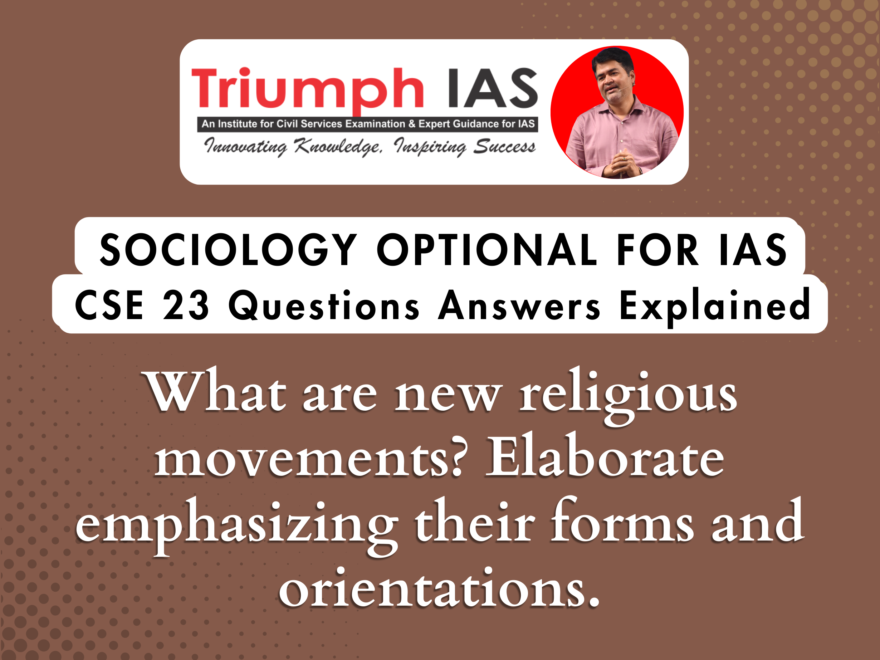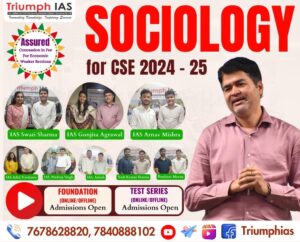What are new religious movements? Elaborate emphasizing their forms and orientations.
Section: B.
Sociology Paper 2023 Analysis.
Relevant for Paper-1 : Unit 8 : religion and society
Question- 8 (B): What are new religious movements? Elaborate emphasizing their forms and orientations.
(20 Marks)
|
Introduction: Define new religious movement. Main Body: Explain forms of religious movement in terms sect , cult , Alternative or Minority Religions, Spiritual or New Age Movements and orientation in terms of world-affirming movements, ascetic practices, world-accommodating movements, radical transformation etc. Conclusion: Significance of new religious movement. |
Introduction
- New Religious Movements (NRMs) can be defined as faith-based groups or communities that have emerged and established their own unique set of religious beliefs and practices. Typically, these movements are differentiated from the mainstream religions and have been formed relatively recently, in the past few centuries or decades.
- These movements are often highly eclectic, pluralistic, and syncretistic; they freely combine doctrines and practices from diverse sources within their belief systems. The new movement is usually founded by a charismatic and sometimes highly authoritarian leader who is thought to have extraordinary powers or insights.
Main Body
Forms of New Religious Movements:
- Sects: They are groups that have broken away from an established religion but continue to follow some of its teachings. Examples from India include the Swaminarayan sect and the Radhasoami Satsang, which originated from Hinduism but have their own unique set of beliefs and practices.
- Cults: These are small, fringe groups that often revolve around a charismatic leader. Cults often have beliefs and practices that are considered unorthodox or controversial by mainstream society. In India, examples include the ‘Godman’ cults such as the Dera Sacha Sauda.
- Alternative or Minority Religions: These are religions that are not part of the mainstream religious landscape of a society. They often incorporate elements from various religious traditions. An example in India is the Bahá’í Faith, which originated in Persia but has found followers in India.
- Spiritual or New Age Movements: These movements often draw from a variety of religious traditions, philosophies, and psychological theories. They emphasise personal spiritual growth and self-realisation. In India, the Art of Living Foundation and the Isha Foundation are examples of such movements.
Orientations of New Religious Movements:
- World-affirming Movements: These movements generally accept the world as it is and seek to help individuals succeed within it. They often focus on self-improvement, prosperity, and personal fulfilment. In India, the Brahma Kumaris World Spiritual University promotes a form of spiritual self-improvement that is world-affirming.
- Ascetic Practices:: These movements are often critical of the secular world and advocate for a radical transformation of society based on their religious beliefs. The Jain monastic traditions in India align closely with this ascetic orientation
- World-accommodating Movements: These movements focus on inner spirituality and individual transformation, without seeking to radically change or reject the secular world. Many of the guru-led movements in India, such as the Osho movement, can be seen as world-accommodating.
- Radical Transformation: Some movements embrace a revolutionary orientation, foreseeing radical and often apocalyptic changes that will lead to the establishment of a utopian society. A notable example is the Aum Shinrikyo in Japan, which prophesied catastrophic events as part of their transformative vision.
- Proselytizing in NRMs: Movements with a conversion orientation actively engage in proselytizing efforts, seeking to attract new members to their fold. The Hare Krishna Movement, originating from India, places a strong emphasis on global evangelism as part of its conversion-oriented approach.
- Syncretism in NRMs: Some NRMs adopt an eclectic orientation, integrating beliefs from various religious traditions into their practices. The Theosophical Society, active in India, exemplifies this approach by incorporating tenets from Hinduism, Buddhism, and Western esoteric traditions into its syncretic framework.
- Business organisation: Stark and Bainbridge look at religions and spiritual movements as if they were business organisations, referring to participants/adherents/congregants as customers or clients. They identify two types of audience and client cults. They identify audience and client cults .
-
- Audience cult: it is one where the participant (or client) is a passive consumer.People might attend lectures, read books or buy DVDs to hear a particular message or consume a particular set of ideas. There is no necessary on-going relationship (other than to buy the next book) or expectations.
- Client cult: client cult is one where the cult has a relationship with its adherents akin to a doctor/patient relationship. The cult is a service provider and the clients enter into a prolonged relationship as they might do with a therapist
Conclusion
New Religious Movements are a significant part of the contemporary religious landscape, reflecting the ongoing evolution and diversification of religious beliefs and practices. In India, these movements have contributed to the rich tapestry of religious life, offering new avenues for spiritual exploration and expression.
Related Blogs…
To master these intricacies and fare well in the Sociology Optional Syllabus, aspiring sociologists might benefit from guidance by the Best Sociology Optional Teacher and participation in the Best Sociology Optional Coaching. These avenues provide comprehensive assistance, ensuring a solid understanding of sociology’s diverse methodologies and techniques.
META TAGS:
Taylorism, Scientific Management, Frederick Taylor, Efficiency, Standardization, Specialization, Worker Exploitation, Organizational Hierarchy, Merits and Demerits, Contemporary Organizational Functioning, Sociology Question Paper, Sociology Question Paper 2023, Sociology Question Paper CYQ, Sociology Question Paper UPSC, What is Taylorism? Analyze its merits and demerits.
Why Vikash Ranjan’s Classes for Sociology?
Proper guidance and assistance are required to learn the skill of interlinking current happenings with the conventional topics. VIKASH RANJAN SIR at TRIUMPH IAS guides students according to the Recent Trends of UPSC, making him the Best Sociology Teacher for Sociology Optional UPSC.
At Triumph IAS, the Best Sociology Optional Coaching platform, we not only provide the best study material and applied classes for Sociology for IAS but also conduct regular assignments and class tests to assess candidates’ writing skills and understanding of the subject.
Choose The Best Sociology Optional Teacher for IAS Preparation?
At the beginning of the journey for Civil Services Examination preparation, many students face a pivotal decision – selecting their optional subject. Questions such as “which optional subject is the best?” and “which optional subject is the most scoring?” frequently come to mind. Choosing the right optional subject, like choosing the best sociology optional teacher, is a subjective yet vital step that requires a thoughtful decision based on facts. A misstep in this crucial decision can indeed prove disastrous.
Ever since the exam pattern was revamped in 2013, the UPSC has eliminated the need for a second optional subject. Now, candidates have to choose only one optional subject for the UPSC Mains, which has two papers of 250 marks each. One of the compelling choices for many has been the sociology optional. However, it’s strongly advised to decide on your optional subject for mains well ahead of time to get sufficient time to complete the syllabus. After all, most students score similarly in General Studies Papers; it’s the score in the optional subject & essay that contributes significantly to the final selection.
“A sound strategy does not rely solely on the popular
Opinion of toppers or famous YouTubers cum teachers.”
It requires understanding one’s ability, interest, and the relevance of the subject, not just for the exam but also for life in general. Hence, when selecting the best sociology teacher, one must consider the usefulness of sociology optional coaching in General Studies, Essay, and Personality Test.
The choice of the optional subject should be based on objective criteria, such as the nature, scope, and size of the syllabus, uniformity and stability in the question pattern, relevance of the syllabic content in daily life in society, and the availability of study material and guidance. For example, choosing the best sociology optional coaching can ensure access to top-quality study materials and experienced teachers. Always remember, the approach of the UPSC optional subject differs from your academic studies of subjects. Therefore, before settling for sociology optional, you need to analyze the syllabus, previous years’ pattern, subject requirements (be it ideal, visionary, numerical, conceptual theoretical), and your comfort level with the subject.
This decision marks a critical point in your UPSC – CSE journey, potentially determining your success in a career in IAS/Civil Services. Therefore, it’s crucial to choose wisely, whether it’s the optional subject or the best sociology optional teacher. Always base your decision on accurate facts, and never let your emotional biases guide your choices. After all, the search for the best sociology optional coaching is about finding the perfect fit for your unique academic needs and aspirations.
Follow us :
🔎 https://www.instagram.com/triumphias
🔎 https://www.youtube.com/c/TriumphIAS
🔎 https://t.me/VikashRanjanSociology
Find More Blogs…
| Compare and contrast Karl Marx’s and Max weber’s | Karl Marx- Historical Materialism |
| Position of Women In the Modern Indian Society | Sociology: Social system and pattern variables |
KEYWORD: New religious movements,New religious movements,New religious movements,New religious movements,New religious movements,New religious movements,New religious movements,New religious movements,New religious movements,New religious movements,New religious movements,New religious movements,New religious movements,New religious movements,New religious movements,New religious movements,


